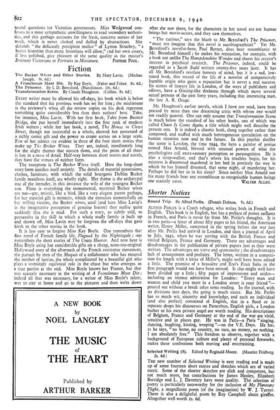Fiction
EVERY writer must be allowed his off-days, his book which is below the standard that his previous work has set for him ; the misfortune is the reviewer's when all the review copies on his desk represent something quite considerably less than their authors' best. Take, for instance, Miss Lavin. With her first book, Tales from Bective Bridge, she put herself immediately into the first rank of modern Irish writers ; while her last book, a novel, The House in Clewe Street, though not successful as a whole, showed her possessed of a richly comic gift and the power to create scenes on a large scale. Few of her talents ?re evident in three of the four short stories that make up The Becker Wives. They are, indeed, inordinately long for the slight themes that sustain them, and the point of all three is lost in a mass of detail. Half-way between short stories and novels, they have the virtues of neither form.
The exception is The Becker Wives itself. Here the long-short story form justifies itself entirely. The details of material possessions, clothes, furniture, with which the solid bourgeois Dublin Becker family manifests itself, are wholly right. Her theme is the archetypal one of the intruder, in this instance the wife of the youngest Becker son. Flora is everything the monumental, maternal Becker wives are not—gay, artistic, like a bird, like a very, elegant parrot perhaps, for her especial gift is mimicry, which she exercises unmercifully on he: willing victims, the Becker wives, until (and here Miss Lavin's is the imaginative perception of genuine horror) they realise quite suddenly that she is mad. For such a story, so subtly told, so persuasive in the skill in which a whole stuffy family is built up and shown off, Miss Lavin may be forgiven the off-days that gave birth to the other stories in the book.
It is less easy to forgive Miss Kay Boyle. One remembers that fine novel of French family life, Plagued by the Nightingale ; one remembers the short stories of The Crazy Hunter. And now here is Miss Boyle using her considerable gifts on a cheap, none-too-original Hollywood story of the aftermath of the French resistance movement, the pursuit by men of the Maquis of a collaborator who has escaped the meshes of justice, the whole complicated by a beautiful girl who plays a seemingly equivocal role in the chase but who emerges as a true patriot at the end. Miss Boyle knows her France, but that was scarcely necessary in the writing of A Frenchman Must Die ; indeed all that was necessary, for a writer of Miss Boyle's talent, was to stay at home and go to the pictures and then write down
what she saw there, for the characters in her novel are not human beings but movie-actors, and they cast themselves.
"The curious," says the blurb to Mr. Beresford's The Prisoner, "must not imagine that this novel is autobiographical." Yet Mr. Beresford's novelist-hero, Paul Barnet, does bear resemblance to Mr. Beresford himself • he makes his reputation for example, with a book not unlike The liampdenshire Wonder and shares his creator's interest in psychical research. The Prisoner, indeed, could be regarded as a 7acob Stahl written twenty-five years later. It has all Mr. Beresford's resolute honesty of mind, but it is a sad, low- toned book, this record of the life of a novelist of comparatively humble origin who gains a reputation but is never a real success. Its scenes of literary life in London, of the ways of publishers and editors, have a Gissing-like drabness through which move several actual persons of the past forty years, including that interesting man, the late A. R. Orage.
Mr. Houghton's earlier novels, which I have not read, have been praised by more than one discerning critic with whom one would not readily quarrel. One can only assume that Transformation Scene is much below the standard of his other books, one of which was called Chaos Is Come Again, a title which might well describe the present one. It is indeed a chaotic book, slung together rather than composed, and stuffed with much heterogeneous speculation on the human situation now and in the future. In this psychic thriller the scene is London, the time 1944, the hero a painter of genius named Max Arnold, blessed with unusual powers of what the psychologists call extra-sensory perception or paracognition. He is also a sleep-walker, and that's where his troubles begin, for his mistress is discovered murdered in her bed in precisely the way in which he has himself dreamed, that same night, of murdering her. Perhaps he did her in in his sleep? Since neither Max Arnold nor his many friends bear any resemblanoe to recognisable human beings


































 Previous page
Previous page